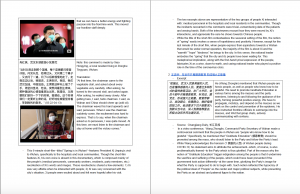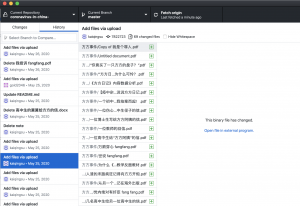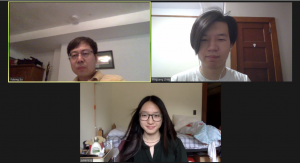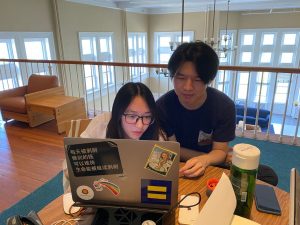Since its outbreak in China at the end of 2019, the COVID-19 Pandemic has been more than a public health issue, but rather, a highly political one. For us, who witnessed the situation escalate and were involved in the pandemic, however remotely, this Ford Scholar project, led by Professor Fubing Su, is significant at both the academic and personal levels. Living with and through COVID-19, we aimed to analyze the pandemic as a case study to gain a deeper understanding of politics in today’s China.
(From left to right: Kaiqing Su, Yinguang Zhao, Photo by Yijia Hu)
The project is composed of three parts. In the first week, we read through and collected a wide range of primary sources and commentary articles on the coronavirus outbreak, prevention, and control in China. We organized them into different themes–such as media, propaganda, civil society, nationalism, memory, central-local government relations, etc. Based on the categorization, we then picked out key events and representational materials to demonstrate the diverse layers of Chinese politics. For example, Professor Su explored the realm of civil society in China through the actions taken by state-controlled GONGOs, partially autonomous NGOs, and individual volunteers; Yinguang studied the comments under Fang Fang and Dr. Li Wenliang’s Weibo–social media accounts of two of the most significant figures during the epidemic–to understand how Chinese people think about freedom of speech, government accountability, and patriotism; Kaiqing analyzed the differences between the official and grassroots timelines, contrasting the two kinds of “memories” constructed. Together, we hope to provide a more nuanced picture of the state, the government, and the people in contemporary China.

(A Screenshot of the Reader of Chinese Politics that We Created)

(A Screenshot of our GitHub Site)
Our individual research projects are ongoing ones, and this summer was a good starting point for us to recollect and reflect on the coronavirus outbreak in China. The virus might be gone someday, but the lessons from this “case study” will remain as open doors.
 (Top left: Prof. Su, top right: Yinguang Zhao, lower middle: Kaiqing Su)
(Top left: Prof. Su, top right: Yinguang Zhao, lower middle: Kaiqing Su)
—-By Kaiqing Su ’21 and Yinguang Zhao ’23, July, 2020.

